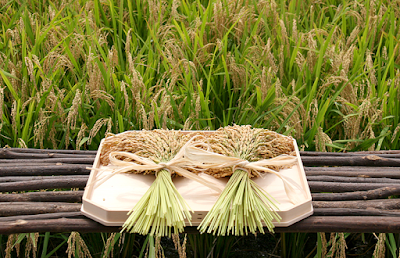Besides it is my parents’ wedding anniversary, November 23 in Japan has been traditionally the imperial feast of the thanksgiving offering of the first fruits of the rice harvest of the year. This feast is called “Niinamesai”(新嘗祭), which literally means new harvest feast.
At Niinamesai,
Emperor of Japan, representing the people of Japan, as their high priest,
offers the first fruits of the rice to deities of Japan as token of gratitude
for their generous providence and ask for their continuous care for the next
year.
Though there has been a period when Emperor of Japan
was deified by constitution, Emperor has been the intermediary being between the
people of Japan and the deities of Japan. In this sense, Emperor of Japan is
like Moses on Mt. Sinai. Pleading to God for His mercy on behalf of the
Israelites and receiving the Law from God representing the Israelites.
Because this imperial feast of thanksgiving offering
of the first fruits is involved with rice, the feast is believed to trace its
roots in the descent of the sun feminine deity, Amaterasu-no-ookami or Amaterasu
(天照大神),
who is the daughter born to Izanagi-nomikoto
(伊邪那岐命)
and Izanami-nomikoto (伊邪那美命),
the creator deities in the Japanese Mythology. Upon her descent from heaven, the world of the
deities, to the land of Japan, the world of people, the sun deity, Amaterasu, brought the rice cultivation,
enabling the land of Japan to grow and harvest rice, in her blessings, so that
people of Japan can eat and prosper.
Emperor of Japan, who is believe to be the direct
descendant of Amaterasu, serves as
the high priest in officiating this annual firs fruits thanksgiving feast
ritual in a special shrine set in the Imperial Palace on this day of every
year.
There are some elements from the Gospel Readings for
the last three Sundays on Cycle A, reflected in contextual juxtaposition to the
above-mentioned Japanese imperial feast of Niinamesai.
As the first fruits offered to the deities of Japan
at Niinamesai is rice, it is also
important to understand what it takes to bring forth the first fruits of rice.
In order to grow rice and enjoy abundant harvest to
bring its first fruits worthy to offer to the deities, farmers have to work
diligently and vigilantly – from seedlings to harvest. In spring, they
carefully prepare rice seedlings, while they fill the rice fields with water
for planting. Then, once planting is done diligently. Afterward, farmers need
to keep their vigilant eyes to protect growing rice plants into summer and
until harvest time. The rice plants can be ruined by insets and weeds. Then,
toward the harvest time, the farmers’ vigilant eyes are to protect rice from
birds. So, the first fruits of rice fit to be offered to the deities at Niinamesai through the priestly role of
Emperor is the fruit of Japanese rice farmers’ diligent and vigilant workmanship
out of the rice grain seed first given by Amaterasu
upon her descent from heaven.
Diligence and vigilance, required to turn seeds into
abundant harvest and finest first fruits are important virtues addressed in the
Parable of the Ten Virgins (Matthew 25:1-13) for the 32nd Sunday in
Ordinary Time, and the Parable of the Talent (Matthew 25:14-30) for the 33rd
Sunday in Ordinary Time.
The Parable of the Sheep and the Goats (Matthew
25:31-46) is about Christ the King judges on our fruitfulness of the agape-love
given and entrusted by Christ.
When Christ descended to earth as Jesus through
Mary, he was given to us as a gift of love by the Father in heaven, as
indicated in John 3:16. And, this gift of love, Christ the Son in Jesus, is
juxtaposed to the original seed of rice, given by Amaterasu, upon her descent.
Then, when Christ was crucified and died, he shed his blood, sprinkled
on the Mercy Seat in heaven, given to us as another seed of love. For this seed
of love, however, Christ himself commanded to let it grow by loving one another
as he has loved us (John 13:34). He also suggested that letting the seed of his
love to us is done by integrating Deuteronomy 6:5 and Leviticus 19:18 – by loving
our neighbors – each other – in light of loving God above all and without
compromise. And, he also gave a good example of how the seed of his love can be
grown into abundant fruits through his Parable of the Good Samaritan (Luke
10:25-37).
So, when Christ the King returns to judge the fruitfulness of our diligent and vigilant work on the seed of love given and entrusted to us, we must be ready to bring forth the finest first fruits of our diligent and vigilant works on God-given seeds of love.
What is the finest first fruits of rice of the year offered to the deities of Japan through Emperor of Japan on behalf of the people of Japan at Niinamesai is like what is the finest first fruits of love, its seedlings have been given by God the Father through Christ the Son, as results of our diligent and vigilant works on this love, empowered by the Holy Spirit. By offering this first fruits of our diligent and vigilant works of love, in thanksgiving, we also love God, who is love, thus, keeping our observance of Deuteronomy 6:5 together with Leviticus 19:18, all the way to the harvest time of the first fruits of love.
Yes, I am also first fruits – the first fruits of my
parents’ love as I am the firstborn son to them, who made their matrimonial
union of love on the Japanese imperial feast day of the first fruits of rice
thanksgiving offering, Niinamesai,
1964.


No comments:
Post a Comment